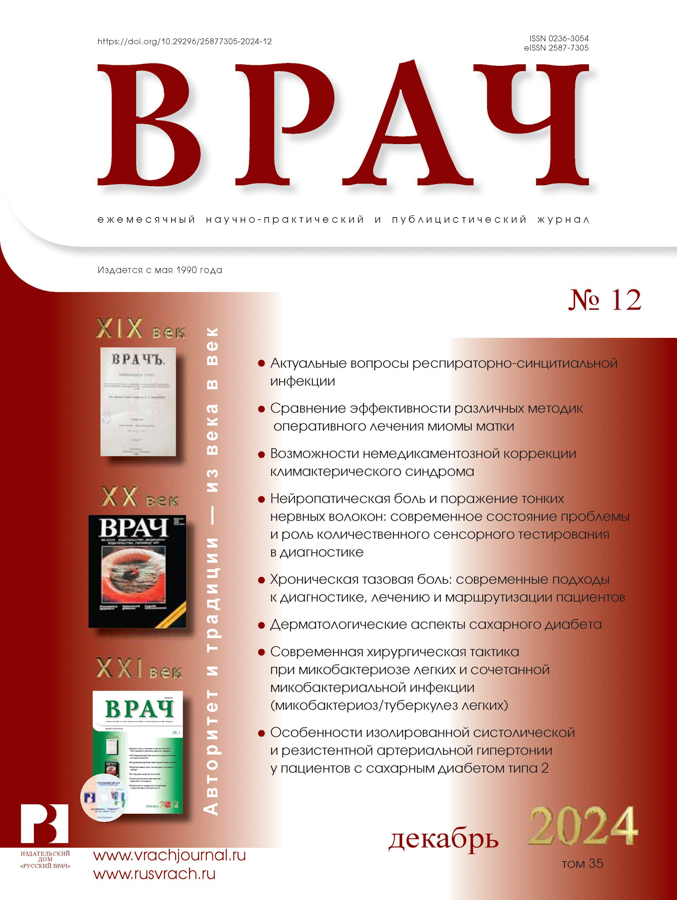Malnutrition is an important factor in the development of protein-energy malnutrition in patients on program hemodialysis: yes or no?
- Authors: Yakovenko A.A.1, Lavrishcheva Y.V.2, Ivanova N.N.3, Belskikh A.N.4
-
Affiliations:
- I.P. Pavlov First Saint Petersburg State Medical University, Ministry of Health of Russia (Pavlov University)
- V.A. Almazov National Medical Research Centre, Ministry of Health of Russia, Ministry of Health of Russia
- Next Level Events LLC
- S.M. Kirov Military Medical Academy
- Issue: Vol 35, No 12 (2024)
- Pages: 76-80
- Section: From Practice
- URL: https://journals.eco-vector.com/0236-3054/article/view/677659
- DOI: https://doi.org/10.29296/25877305-2024-12-14
- ID: 677659
Cite item
Abstract
The development of protein-energy malnutrition (PEM) in patients on program hemodialysis is one of the pressing health problems. However, today there is no single point of view on the mechanisms of development of PEM in this cohort of patients.
Purpose. To evaluate the impact of malnutrition in the pathogenesis of PEM in patients receiving treatment with program hemodialysis.
Material and methods. The study involved 645 patients receiving treatment with program hemodialysis (300 men and 345 women).
Results. Signs of malnutrition were observed in 61 (9.5%) patients, including inadequate protein intake in 27 (4.19%), inadequate energy intake in the diet in 21 (3.26%), inadequate protein intake and inadequate energy intake in the diet – in 13 (2.02%). In patients with inadequate protein intake and inadequate energy supply in the diet, according to the food diary, statistically significantly lower values of the main indicators of nutritional status were revealed compared to the group of patients with adequate protein intake and energy supply in the diet.
Conclusion. Malnutrition remains one of the significant factors in the development of PEM in patients on hemodialysis.
Keywords
Full Text
About the authors
A. A. Yakovenko
I.P. Pavlov First Saint Petersburg State Medical University, Ministry of Health of Russia (Pavlov University)
Author for correspondence.
Email: leptin-rulit@mail.ru
ORCID iD: 0000-0003-1045-9336
Candidate of Medical Sciences
Russian FederationYu. V. Lavrishcheva
V.A. Almazov National Medical Research Centre, Ministry of Health of Russia, Ministry of Health of Russia
Email: leptin-rulit@mail.ru
ORCID iD: 0000-0002-3073-2785
Candidate of Medical Sciences
Russian Federation, Saint PetersburgN. N. Ivanova
Next Level Events LLC
Email: leptin-rulit@mail.ru
United Arab Emirates, Dubai
A. N. Belskikh
S.M. Kirov Military Medical Academy
Email: leptin-rulit@mail.ru
ORCID iD: 0000-0002-0421-3797
Professor, Corresponding Member of the Russian Academy of Sciences, MD
Russian Federation, Saint PetersburgReferences
- Carrero J.J., Thomas F., Nagy K. et al. Global Prevalence of Protein-Energy Wasting in Kidney Disease: A Meta-analysis of Contemporary Observational Studies From the International Society of Renal Nutrition and Metabolism. J Ren Nutr. 2018; 28 (6): 380–92. doi: 10.1053/j.jrn.2018.08.006
- Kang S.S., Chang J.W., Park Y. Nutritional Status Predicts 10-Year Mortality in Patients with End-Stage Renal Disease on Hemodialysis. Nutrients. 2017; 9 (4): pii:E399. doi: 10.3390/nu9040399
- Fouque D., Kalantar-Zadeh K., Kopple J. et al. A proposed nomenclature and diagnostic criteria for protein-energy wasting in acute and chronic kidney disease. Kidney Int. 2008; 73 (4): 391–8. doi: 10.1038/sj.ki.5002585
- Perez Vogt B., Costa Teixeira Caramori J. Are Nutritional Composed Scoring Systems and Protein-Energy Wasting Score Associated With Mortality in Maintenance Hemodialysis Patients? J Ren Nutr. 2016; 26 (3): 183–9. doi: 10.1053/j.jrn.2015.11.003
- Obi Y., Qader H., Kovesdy C.P. et al. Latest consensus and update on protein-energy wasting in chronic kidney disease. Curr Opin Clin Nutr Metab Care. 2015; 18 (3): 254–62. doi: 10.1097/MCO.0000000000000171
- Wang X.H., Mitch W.E. Mechanisms of muscle wasting in chronic kidney disease. Nat Rev Nephrol. 2014; 10 (9): 504–16. doi: 10.1038/nrneph.2014.112
- Ikizler T.A., Burrowes J.D., Byham-Gray L.D. et al; KDOQI Nutrition in CKD Guideline Work Group. KDOQI clinical practice guideline for nutrition in CKD: 2020 update. Am J Kidney Dis. 2020; 76 (3suppl1): S1-S107. doi: 10.1053/j.ajkd.2020.05.006
Supplementary files






